Footballers love crowds and the sound of fans cheering and chanting their names. The Premier League is one of the most popular and vibrant leagues in the world. Premier League fans are often energetic and passionate when supporting their team. The capacity of Premier League stadiums varies from club to club. In this article, Wintips will focus on the biggest football stadium in Premier League. So, let’s take a look at the largest football stadiums in the Premier League in 2024, the capacity of these sporting arenas, and the highest attendance these stadiums have ever recorded.
Which Premier League stadium is the largest?
10. Villa Park
Aston Villa is one of the most prominent football clubs in England, which owns the 42,657-capacity Villa Park stadium. The stadium opened in 1897 and has since become a historic venue, witnessing many important sporting events. Villa Park has hosted three matches in the 1966 World Cup, four matches in the 1996 European Championship, the 1981 League Cup final, and 55 FA Cup semi-finals.
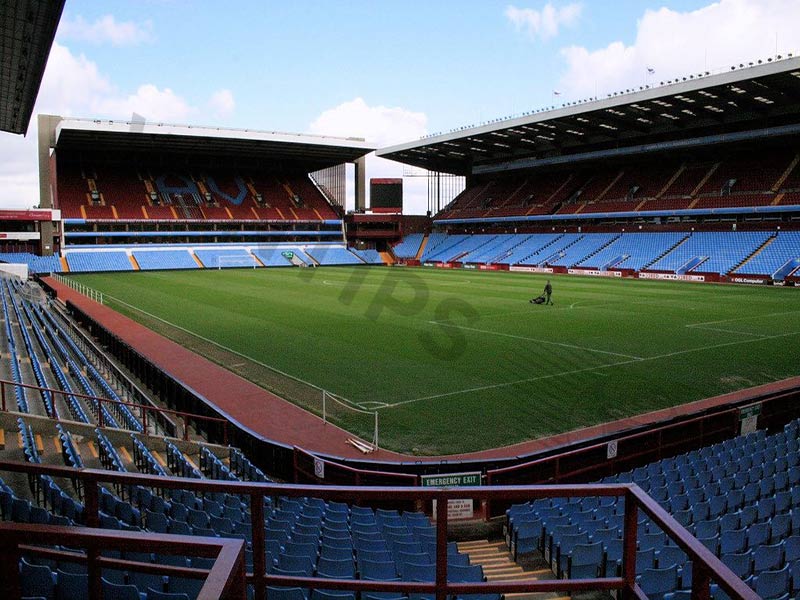
In addition to being the home ground of Aston Villa, Villa Park is also used for many other sporting events, including England international matches and other global events. The stadium has also hosted other sporting events, such as boxing and rugby matches, bringing many memorable experiences to sports fans.
With its prime location and growing importance, Villa Park is constantly evolving. There are currently plans to redevelop the stadium, with the aim of increasing its capacity to around 55,000. This would make the stadium an ideal venue for international sporting events, while also greatly enhancing the experience for Aston Villa fans and other spectators alike.
9. Stadium of Light
Sunderland is home to a modern 49,000-seat stadium, which opened in 1997. It has hosted major football matches, including the 2004 England vs Turkey match and the 2016 England vs Australia friendly. The stadium has also hosted major concerts, featuring performances from the likes of Oasis, Rihanna, and Beyoncé.
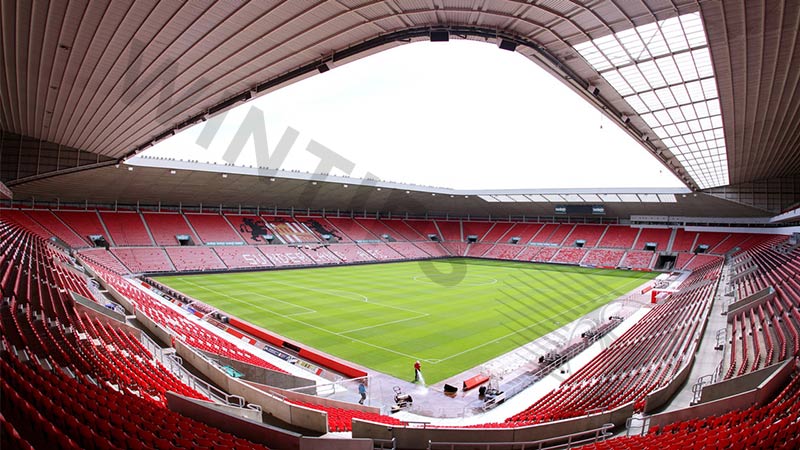
Although Sunderland is currently playing in the Championship, their stadium still meets the standards of a Premier League club and is ready to host international events and European matches. The stadium's capacity can be expanded to over 55,000 seats for special events, demonstrating that it is a versatile venue suitable for a wide range of events, from sports to entertainment.
8. St James' Park
Newcastle United owns a prominent stadium with a capacity of 52,305, which opened in 1892. With its long history and influence, St James' Park has hosted many important sporting events. Notable events include international matches for the England team, such as matches against Albania in 2001 and Azerbaijan in 2005. In addition, the stadium was the venue for three matches at Euro 1996, attracting thousands of fans to enjoy top-class football. St James' Park has also been the venue for major concerts featuring legendary artists such as The Rolling Stones, providing unforgettable music experiences for the audience.
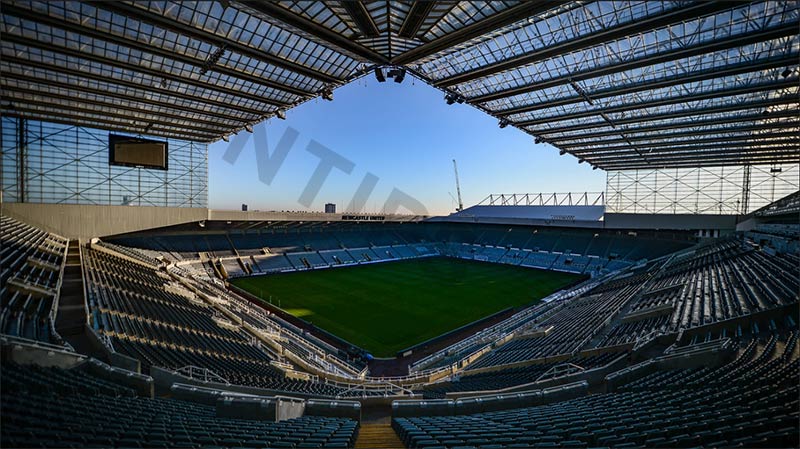
St James' Park Stadium is not only impressive in design but also in location, with spectacular views of the city of Newcastle. The atmosphere here is always vibrant and electric, especially when the home team is performing well. The passion of the fans at St James' Park creates an unforgettable atmosphere, making this stadium one of the most captivating sporting destinations in the UK. Hosting international sporting and entertainment events, St James' Park is a worthy symbol of the city of Newcastle.
7. Anfield
Liverpool is home to Anfield Stadium, which opened in 1884 and has a capacity of 53,394. It is one of the most famous stadiums in the world, having hosted many important sporting events, including four matches at Euro 1996, and several FA Cup semi-finals. Anfield has also been the scene of many historic moments in football, especially in the Champions League. One of the most memorable was the 4-0 victory over Barcelona in the semi-finals of the 2018-2019 season, when the song 'You'll Never Walk Alone' echoed throughout the stadium, creating a passionate and emotional atmosphere.
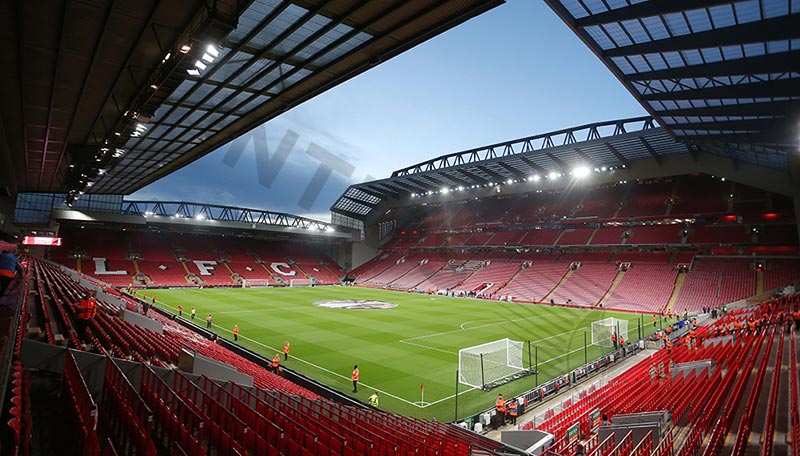
Through many reconstructions and upgrades, Anfield has retained its character and has become a symbol of Liverpool Football Club. A stadium is not only a place for sports but also a symbol of history, where fans can feel a deep connection with the team and the great legacy they have built.
6. Etihad Stadium
Manchester City's 53,400-capacity stadium, which opened in 2002, has hosted numerous significant events, including the 2002 Commonwealth Games, the 2008 UEFA Cup Final, the memorable Manchester City v QPR match in 2012, and concerts featuring Take That.
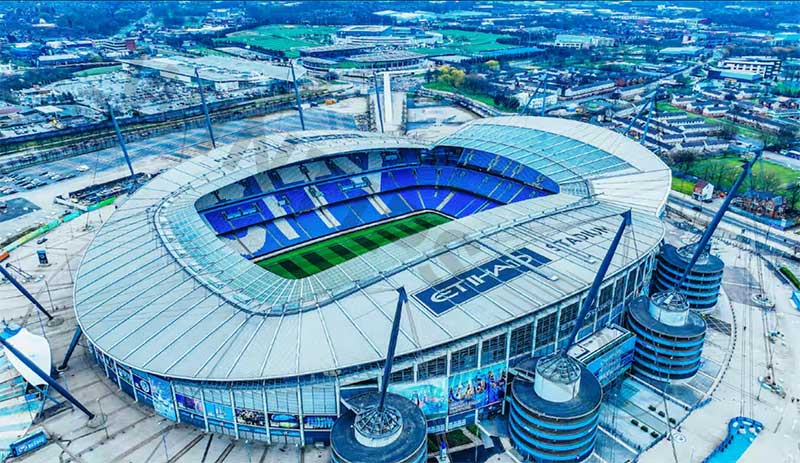
Formerly known as the City of Manchester Stadium, it is a fitting stage for Pep Guardiola's superstars. It was here that Sergio Aguero scored an injury-time winner against QPR on the final day of the 2011/12 season, securing City's first league title in over 30 years.
Although its atmosphere has sometimes been criticized, the stadium itself is of a high standard, and there are several other sporting venues in close proximity. Before being acquired by City, the stadium was used for the 2002 Commonwealth Games.
5. Emirates Stadium
Arsenal is home to the 60,704-seat Emirates Stadium, which opened in 2006. It is not only the home of the team but also a versatile venue, hosting numerous large-scale sporting and entertainment events. Emirates Stadium has hosted matches in the 2022 Rugby World Cup, along with major concerts, most notably featuring Coldplay. With its modern architecture and state-of-the-art facilities, Emirates has become an icon of football and entertainment culture.
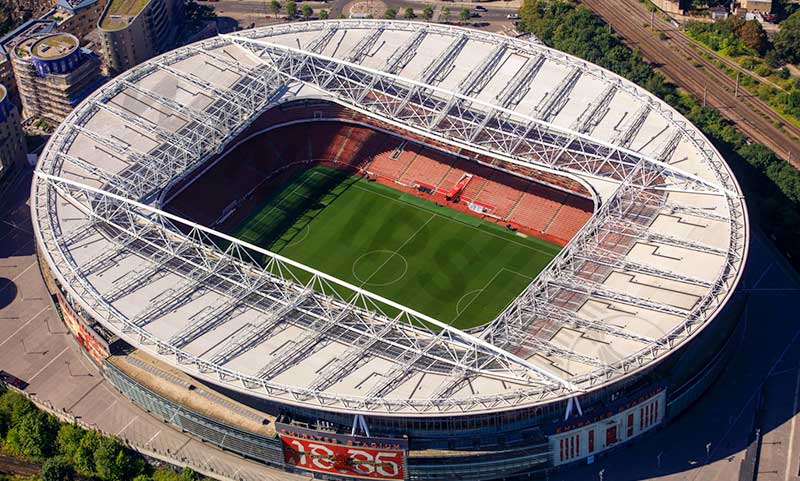
When Arsenal decided to leave their legendary home ground, Highbury, in 2006, the move to Emirates Stadium marked a significant turning point in the club's history. The new stadium provides a spacious, modern environment that supports the Gunners' developmental ambitions. Under Mikel Arteta, Arsenal has enjoyed a resurgence in morale, with a young and promising squad. The atmosphere at the Emirates has become more positive than ever, with Arsenal fans consistently supporting their team in recent seasons, creating a vibrant and passionate environment at the north London stadium.
4. London Stadium
West Ham United owns the 62,500-seat London Stadium, which opened in 2012 and has been the club's home since 2016. It is not only the Hammers' home ground but also a prominent venue, hosting many major sporting events. The stadium has hosted the 2012 Olympic Games, the 2015 Rugby World Cup, and the 2019 London Rugby Series, reinforcing its important role in international sporting events.
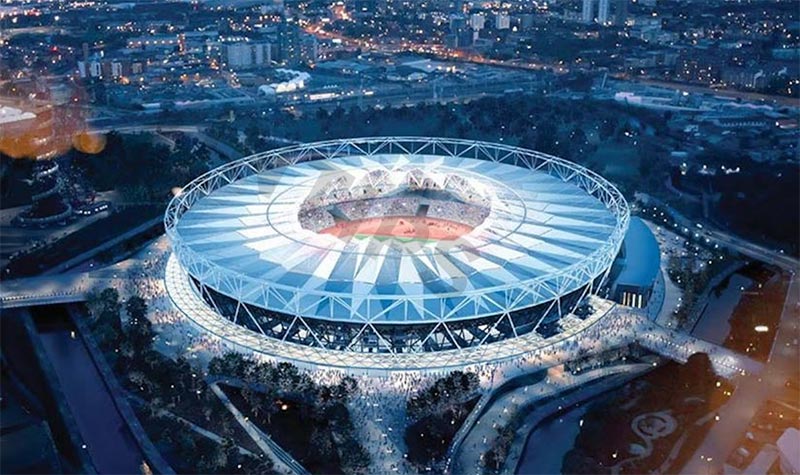
When West Ham decided to move from their home ground, Upton Park, to the London Stadium, many fans expressed concerns about the stadium's suitability for football, as its design was primarily for athletics, as demonstrated by the 2012 Olympics. However, after a period of transition, the team, led by David Moyes, has gradually settled into the new stadium, and the atmosphere here has significantly improved.
West Ham's matches have consistently drawn enthusiastic attention from fans, especially when the team has hosted strong European opponents in recent seasons. The London Stadium has now become an indispensable part of West Ham's development journey, helping to create a high-class playing environment.
3. Tottenham Hotspur Stadium
Tottenham is home to a modern stadium with a capacity of 62,850 seats, which opened in 2019. This is not only the home of the team but also a renowned venue, hosting many major sporting events. The stadium hosted matches during the NFL London Games, drawing significant attention from fans of the sport in the UK. In addition, the stadium was the venue for the famous boxing match between Anthony Joshua and Oleksandr Usyk, which attracted global interest.
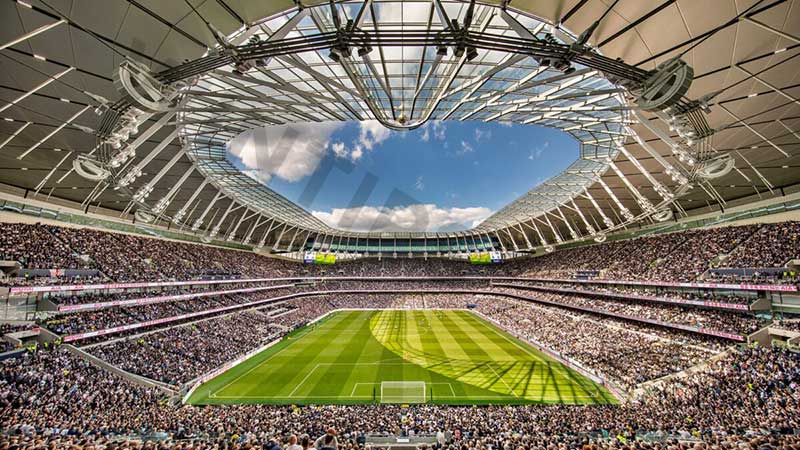
Tottenham's stadium was built on the land of their old home, White Hart Lane, where the club played for decades. With the aim of hosting diverse sporting events, the stadium was specifically designed to cater to both soccer and American football, with separate facilities for each sport. It is one of the most impressive and beautifully designed stadiums, featuring modern architecture and advanced technology.
Anyone visiting this stadium cannot help but be amazed by its grandeur and sophistication. Tottenham Hotspur Stadium has quickly established itself as one of the top competition venues, not only in England but also around the world.
2. Old Trafford
Manchester United owns Old Trafford, which opened in 1910 and has a capacity of 74,310. It is one of the oldest and most famous stadiums in the world and has been associated with many notable sporting events. In addition to being the home ground of the Red Devils, Old Trafford has hosted important international matches, including three at the 1966 World Cup and five at Euro 1996. This has cemented the stadium's status as an icon of international football.
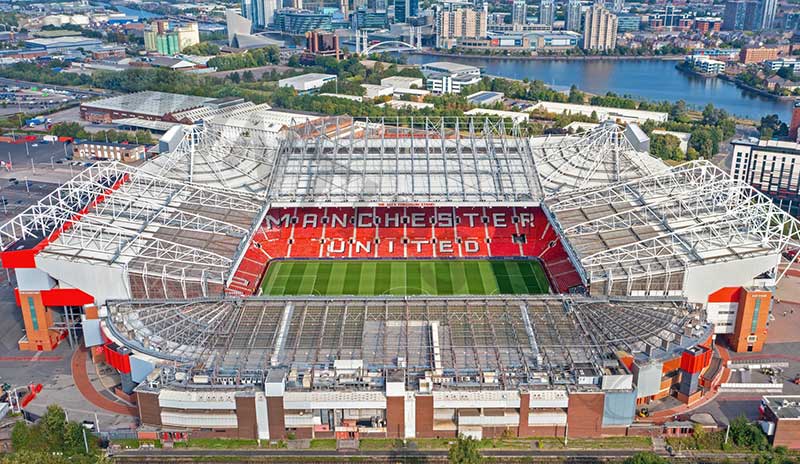
During the Sir Alex Ferguson era, Old Trafford underwent numerous upgrades, expanding its capacity to meet the growing demand from fans. Despite the changes throughout the decades, Old Trafford has retained its character and remains one of the most recognizable stadiums in the world.
In addition to Manchester United matches, the stadium has also hosted major sporting events, particularly during the period when Wembley was being rebuilt, with important matches for the England national team being played here. Every match at Old Trafford brings an exciting and emotional atmosphere, witnessing memorable moments in football history.
1. Wembley
Wembley Stadium, with a capacity of 90,000, opened in 2007 and is one of the most iconic stadiums in English football. Not only is it the home of the England national team, but it has also hosted many major sporting events. Wembley has witnessed the Euro 2020 finals, the FA Cup finals, along with the Champions League finals in 2011 and 2013, affirming its position on the world sports map.
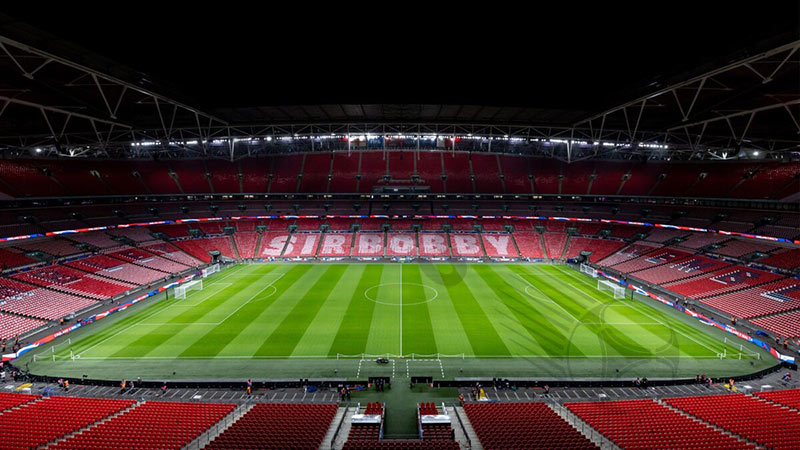
Wembley is also the site of England's only victory in the 1966 World Cup, an unforgettable event for football fans. Although the stadium's reconstruction encountered many delays, the end result is a project worthy of English football's stature.
The stadium is not only used for football, but it also hosts a variety of other sporting events and major concerts, attracting top artists. Every English footballer dreams of playing at Wembley, which remains the country's largest and most impressive football stadium. Wembley will undoubtedly continue to be the home of English football, a place filled with great moments and inspiration for generations of players.
Conclusion
The biggest football stadium in Premier League is Wembley Stadium, with a seating capacity of 90,000. Opened in 2007, Wembley serves as the home of the England national team and hosts some of the most prestigious events in football, including the Euro 2020 final, FA Cup finals, and Champions League finals. While clubs like Manchester United and Tottenham have impressive stadiums, Wembley remains the largest in the country, offering an unparalleled atmosphere for major football events. Its sheer size and historical significance make Wembley a landmark in English football.
See more: When did Ronaldo start youtube?







